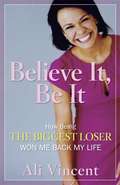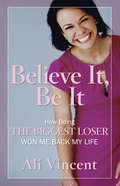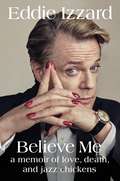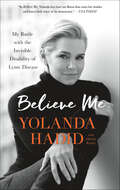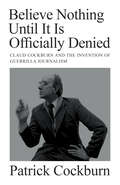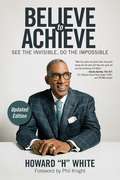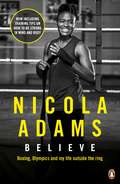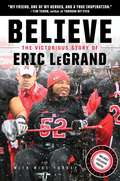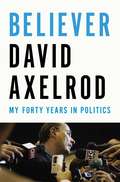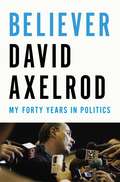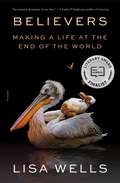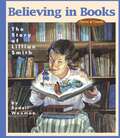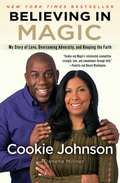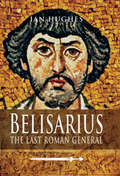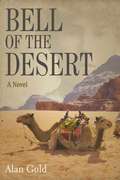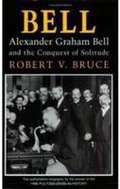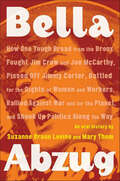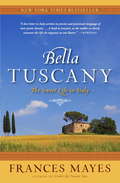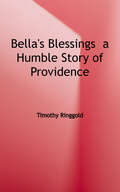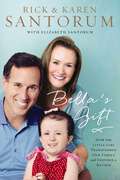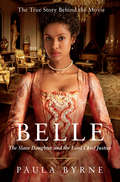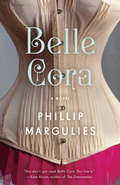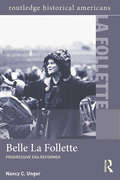- Table View
- List View
Believe It, Be It: How Being the Biggest Loser Won Me Back My Life
by Ali VincentWhen Ali Vincent was selected to be a contestant on the hit NBC show The Biggest Loser, her weight was at an all-time high of 234 pounds and her life had reached an all-time low. Like millions of Americans, Ali struggled for years with poor eating habits, family problems, stress, and low-self-esteem. After years of being afraid, ashamed, and unhappy, she resolved to change her life, once and for all: to lose weight, get healthy, and pursue her dreams. Before she was even offered a spot on The Biggest Loser campus, Ali made up her mind that she was going to not only drop the weight but win the competition. In her bedroom at The Biggest Loser ranch, Ali rang a little bell she kept on her bedside table each night before she went to sleep and again when she awoke in the morning, repeating the phrase that had become her mantra: Believe it, be it. Seven months later, she emerged from the grueling competition as its first-ever female champion, claiming the title, the grand prize and, most of all-- winning back her life. In Believe It, Be It, Ali shares for the first time her intimate story of personal and physical transformation and provides a rare glimpse inside life at the famous Biggest Loser ranch. Ali also shares the weight-loss strategies, eating habits, and workout tips that helped her lose and keep off more than 100 pounds. For anyone who has ever battled with weight loss or struggled to accept themselves for who they are, Ali Vincent's story provides hope that a happier, healthier, more fulfilling life is within reach. It all begins with believing that it's possible. Believe it, and be it.
Believe It, Be It: How Being the Biggest Loser Won Me Back My Life
by Ali VincentWhen Ali Vincent was selected to be a contestant on the hit NBC show The Biggest Loser, her weight was at an alltime high of 234 pounds—and her life had reached an all-time low. Like millions of Americans, Ali struggled for years with poor eating habits, family problems, stress, and low-self-esteem. After years of being afraid, ashamed, and unhappy, she resolved to change her life, once and for all: to lose weight, get healthy, and pursue her dreams. Before she was even offered a spot on The Biggest Loser campus, Ali made up her mind that she was going to not only drop the weight—but win the competition. In her bedroom at The Biggest Loser ranch, Ali rang a little bell she kept on her bedside table each night before she went to sleep and again when she awoke in the morning, repeating the phrase that had become her mantra: Believe it, be it. Seven months later, she emerged from the grueling competition as its first-ever female champion, claiming the title, the grand prize and, most of all, winning back her life. In Believe It, Be It, Ali shares for the first time her intimate story of personal and physical transformation and provides a rare glimpse inside life at the famous Biggest Loser ranch. Ali also shares the weight-loss strategies, eating habits, and workout tips that helped her lose—and keep of—more than 100 pounds. For anyone who has ever battled with weight loss or struggled to accept themselves for who they are, Ali Vincent's story provides hope that a happier, healthier, more fulfilling life is within reach. It all begins with believing that it's possible. Believe it, and be it.
Believe Me: A Memoir of Love, Death, and Jazz Chickens
by Eddie IzzardA Vulture and Interrobang Summer Reading pick“A wicked, beautiful man has written a wicked, beautiful book about his (kind of?) messed up life and it’s…perfect.” —Patton OswaltWith his brand of keenly intelligent humor that ranges from world history to historical politics, sexual politics, mad ancient kings, and chickens with guns, Eddie Izzard has built an extraordinary fan base that transcends age, gender, and race. Writing with the same candor and insight evident in his comedy, he reflects on a childhood marked by the loss of his mother, boarding school, and alternative sexuality, as well as a life in comedy, film, politics, running and philanthropy.Honest and generous, Believe Me is an inspired account of a very singular life thus far.
Believe Me: My Battle with the Invisible Disability of Lyme Disease
by Michele Bender Yolanda HadidFrom the star of The Real Housewives of Beverly Hills comes an emotional and eye opening behind-the-scenes look at her descent into uncovering the mystery of chronic Lyme disease.In early 2011, Yolanda was struck by mysterious symptoms including brain fog, severe exhaustion, migraines and more. Over the months and years that followed, she went from being an outspoken, multi-tasking, hands-on mother of three, reality TV star, and social butterfly, to a woman who spent most of her time in bed. Yolanda was turned inside out by some of the country’s top hospitals and doctors, but due to the lack of definitive diagnostic testing, she landed in a dark maze of conflicting medical opinions, where many were quick to treat her symptoms but could never provide clear answers to their possible causes.In this moving, behind the scenes memoir, Yolanda Hadid opens up in a way she has never been able to in the media before. Suffering from late stage Lyme, a disease that is an undeniable epidemic and more debilitating than anyone realizes, Yolanda had to fight with everything she had to hold onto her life. While her struggle was lived publicly, it impacted her privately in every aspect of her existence, affecting her family, friends and professional prospects. Her perfect marriage became strained and led to divorce. It was the strong bond with her children, Gigi, Bella and Anwar, that provided her greatest motivation to fight through the darkest days of her life. Hers is an emotional narrative and all-important read for anyone unseated by an unexpected catastrophe. With candor, authenticity and an unwavering inner strength, Yolanda reveals intimate details of her journey crisscrossing the world to find answers for herself and two of her children who suffer from Lyme and shares her tireless research into eastern and western medicine. Believe Me is an inspiring lesson in the importance of having courage and hope, even in those moments when you think you can’t go on.
Believe Nothing Until it is Officially Denied: Claud Cockburn and the Invention of Guerrilla Journalism
by Patrick CockburnThe Extraordinary Life of a Revolutionary JournalistRadical journalist Claud Cockburn fought successfully against the political and media establishment, writing for publications as varied as The Times and Private Eye. To Graham Greene, he was the greatest journalist of the twentieth century.Born in China in 1904 and educated alongside Evelyn Waugh, Cockburn launched into a stellar career as a Times correspondent, first in Berlin, then New York, interviewing Al Capone in Chicago, and finally Washington. He resigned in 1932 to start The Week, an anti-Nazi and anti-establishment newsletter with an influence out of all proportion to its circulation. British officials were horrified by the scoops he published. These included stories on the political influence of German appeasers – the Cliveden Set – in the British elite and the previously suppressed news of Edward VIII&’s abdication.Cockburn wrote dispatches while fighting in the Spanish Civil War. In Spain, he helped W. H. Auden and clashed with George Orwell. Claud&’s private life, too, was eventful. He was married three times, once to Jean Ross, the model for Christopher Isherwood&’s Sally Bowles.Patrick Cockburn, himself an international journalist, chronicles his father Claud&’s lifelong dedication to a guerrilla campaign against the powerful on behalf of the powerless. It is a biography for today&’s age, in which journalism is frequently suppressed, overshadowed, undervalued, and corrupted
Believe to Achieve: See the Invisible, Do the Impossible
by Phil Knight Howard WhiteSometimes we need a hand to help us get to the gifts locked inside us. Believe to Achieve is that helping hand, daring readers of all ages to reach for their most cherished dream and giving them the tools to get there. Author Howard "H" White tells us extraordinary people are simply ordinary people on fire with desire -- and he knows. As Nike, Inc.'s liaison for athletes such as Michael Jordan and Charles Barkley, "H" has had plenty of experience with superstars. But he did not start there. He has known extraordinary people his whole life, from his family and friends to his coaches and teachers. All along the way, Howard has met people who have opened his eyes to his own abilities, and he has spent his life doing the same for others. Full of behind-the-scenes moments with favorite athletes as well as funny anecdotes, Believe to Achieve is an exuberant collection of wisdom that will help you recognize the potential in yourself and see the path to success. It is a handbook for all people who have a goal they do not know how to reach or who want to help others discover their gifts. As Howard says, you can never tell what people are capable of just by looking at them -- even you.
Believe: An empowering and honest memoir from Leigh-Anne Pinnock, member of one of the world's biggest girl bands, Little Mix.
by Leigh-Anne Pinnock'I found my power when I realized it was within me, within my skin and within my soul. It just needed to be set free.' Leigh-Anne Pinnock's life changed overnight when she became part of the first ever girl band to win the X-Factor. The multi-platinum selling supergroup Little Mix, went on to become one of the biggest girl bands of all time.Launched into chart-topping global fame, Leigh-Anne was living her childhood dream of becoming a popstar. But behind the scenes, as a Black woman within an industry and team with little diversity, Leigh-Anne was struggling with her identity and felt completely lost. In her highly anticipated memoir, Leigh-Anne shares her journey from growing up in a mixed-race family in Britain to taking the pop world by storm. Honest and direct, she reveals the challenges and prejudices that stood in her path and how she overcame them by embracing her own power. Sharing the experiences and lessons that have shaped Leigh-Anne, this book will empower us all to challenge the status quo, stand up for what we believe in and go after our dreams.
Believe: Boxing, Olympics and my life outside the ring
by Nicola AdamsTHE STORY BEHIND THE WOMAN WHO CHANGED THE FACE OF BOXING FOREVER, OBE NICOLA ADAMSAt London 2012, Nicola Adams made history when she became the first woman ever to win an Olympic Gold medal for boxing. In Rio 2016, with the nation cheering her on, she did it all over again. Years of relentless training, fundraising and determination have seen Nicola battle through injury, prejudice and defeat to become one of Britain best-loved athletes and an inspiration to all those who are chasing after a seemingly impossible dream. From a leisure centre in Leeds to the Olympic Stadium in Rio, Nicola with her famous smile has become an LGBTQ+ icon and the poster girl for women in sport. This is her story of grit, talent and the real person behind the smile.Nicola partnered Katya Jones in BBC's Strictly Come Dancing first same-sex couple. ____________________WHAT READERS ARE SAYING ABOUT NICOLA:'One book every woman or girl should read' Reader Review'Fascinating to see how Nicola and her family had to fight to get women's boxing recognised' Reader Review'Nicola tells this story from the heart, very honest, very open' Reader Review'The positivity, strength, determination of Nicola is uplifting. I really appreciated how she fought for women's rights to do boxing' Reader Review
Believe: Young Readers Edition
by Mike Yorkey Eric LegrandBelieve is the profoundly moving story of Eric LeGrand, the former defensive tackle for the Rutgers University Scarlet Knights football team, who suffered a severe spinal cord injury and was left paralyzed by a crushing on-field tackle during a heated game with Army. A remarkable true account of a courageous young athlete whose unshakable faith, spirit, positive outlook, and rousing motto, “BELIEVE!” would serve as inspiration to legions of fans—and as motivation in his own quest to walk again—Eric’s story has received national attention, heavily covered by ESPN and Sports Illustrated
Believer
by David AxelrodNew York Times Book Review"A stout defense--indeed, the best I have read--of the Obama years... David Axelrod has written a highly readable, uplifting account of the candidate he loves--and, reassuringly, has shown politics can still be a calling, not a business."David Axelrod has always been a believer. Whether as a young journalist investigating city corruption, a campaign consultant guiding underdog candidates against entrenched orthodoxy, or as senior adviser to the president during one of the worst crises in American history, Axelrod held fast to his faith in the power of stories to unite diverse communities and ignite transformative political change. Now this legendary strategist, the mastermind behind Barack Obama's historic election campaigns, shares a wealth of stories from his forty-year journey through the inner workings of American democracy. Believer is the tale of a political life well lived, of a man who never gave up on the deepest promises our country has to offer.Believer reveals the roots of Axelrod's devotion to politics and his faith in democratic change. As a child of the '60s in New York City, Axelrod worked his first campaigns during a tumultuous decade that began with soaring optimism and ended in violence and chaos. As a young newspaperman in Chicago during the 1970s and '80s, Axelrod witnessed another world transformed when he reported on the dissolution of the last of the big city political machines--Richard Daley, Dan Rostenkowski, and Harold Washington--along with the emergence of a dynamic black independent movement that ultimately made Obama's ascent possible.After cutting his teeth in the rollicking world of Chicago journalism, Axelrod switched careers to become a political strategist. His unorthodox tactics during his first campaign helped him get Paul Simon unexpectedly elected to the Senate, and soon Axelrod's counsel was sought by the greatest lights of the Democratic Party. Working for path breakers like Hillary Clinton, Deval Patrick, and Rahm Emanuel--and morally conflicted characters like Rod Blagojevich and John Edwards--Axelrod, for better and worse, redefined the techniques by which modern political campaigns are run.The heart of Believer is Axelrod's twenty-year friendship with Barack Obama, a warm partnership that inspired both men even as it propelled each to great heights. Taking a chance on an unlikely candidate for the U.S. Senate, Axelrod ultimately collaborated closely with Obama on his political campaigns, and served as the invaluable strategist who contributed to the tremendous victories of 2008 and 2012. Switching careers again, Axelrod served as senior adviser to the president during one of the most challenging periods in national history: working at Obama's side as he battled an economic disaster; navigated America through two wars; and fought to reform health care, the financial sector, and our gridlocked political institutions. In Believer, Axelrod offers a deeper and richer profile of this extraordinary figure--who in just four years vaulted from the Illinois State Senate to the Oval Office--from the perspective of one who was at his side every step of the way.Spanning forty years that include corruption and transformation, turmoil and progress, Believer takes readers behind the closed doors of politics even as it offers a thrilling call to democratic action. Axelrod's Believer is a powerful and inspiring memoir enlivened by the charm and candor of one of the greatest political strategists in recent American history.DORIS KEARNS GOODWIN, author of The Bully Pulpit and Team of Rivals"Beautifully written with warmth, humor, and remarkable self-awareness, Believer is one of the finest political memoirs I have ever read."From the Hardcover edition.
Believer: My Forty Years in Politics
by David AxelrodDavid Axelrod has always been a believer. Whether as a young journalist investigating city corruption, a campaign consultant guiding underdog candidates against entrenched orthodoxy, or as senior adviser to the president during one of the worst crises in American history, Axelrod held fast to his faith in the power of stories to unite diverse communities and ignite transformative political change. Now this legendary strategist, the mastermind behind Barack Obama’s historic election campaigns, shares a wealth of stories from his forty-year journey through the inner workings of American democracy. Believer is the tale of a political life well lived, of a man who never gave up on the deepest promises our country has to offer.<P><P> Believer reveals the roots of Axelrod’s devotion to politics and his faith in democratic change. As a child of the ’60s in New York City, Axelrod worked his first campaigns during a tumultuous decade that began with soaring optimism and ended in violence and chaos. As a young newspaperman in Chicago during the 1970s and ’80s, Axelrod witnessed another world transformed when he reported on the dissolution of the last of the big city political machines—Richard Daley, Dan Rostenkowski, and Harold Washington—along with the emergence of a dynamic black independent movement that ultimately made Obama’s ascent possible.<P> After cutting his teeth in the rollicking world of Chicago journalism, Axelrod switched careers to become a political strategist. His unorthodox tactics during his first campaign helped him get Paul Simon unexpectedly elected to the Senate, and soon Axelrod’s counsel was sought by the greatest lights of the Democratic Party. Working for path breakers like Hillary Clinton, Deval Patrick, and Rahm Emanuel—and morally conflicted characters like Rod Blagojevich and John Edwards—Axelrod, for better and worse, redefined the techniques by which modern political campaigns are run.<P> The heart of Believer is Axelrod’s twenty-year friendship with Barack Obama, a warm partnership that inspired both men even as it propelled each to great heights. Taking a chance on an unlikely candidate for the U.S. Senate, Axelrod ultimately collaborated closely with Obama on his political campaigns, and served as the invaluable strategist who contributed to the tremendous victories of 2008 and 2012. Switching careers again, Axelrod served as senior adviser to the president during one of the most challenging periods in national history: working at Obama’s side as he battled an economic disaster; navigated America through two wars; and fought to reform health care, the financial sector, and our gridlocked political institutions. In Believer, Axelrod offers a deeper and richer profile of this extraordinary figure—who in just four years vaulted from the Illinois State Senate to the Oval Office—from the perspective of one who was at his side every step of the way.<P> Spanning forty years that include corruption and transformation, turmoil and progress, Believer takes readers behind the closed doors of politics even as it offers a thrilling call to democratic action. Axelrod’s Believer is a powerful and inspiring memoir enlivened by the charm and candor of one of the greatest political strategists in recent American history.
Believers: Making a Life at the End of the World
by Lisa WellsIn search of answers and action, the award-winning poet and essayist Lisa Wells brings us Believers, introducing trailblazers and outliers from across the globe who have found radically new ways to live and reconnect to the Earth in the face of climate change We find ourselves at the end of the world. How, then, shall we live?Like most of us, Lisa Wells has spent years overwhelmed by increasingly urgent news of climate change on an apocalyptic scale. She did not need to be convinced of the stakes, but she could not find practical answers. She embarked on a pilgrimage, seeking wisdom and paths to action from outliers and visionaries, pragmatists and iconoclasts. Believers tracks through the lives of these people who are dedicated to repairing the earth and seemingly undaunted by the task ahead.Wells meets an itinerant gardener and misanthrope leading a group of nomadic activists in rewilding the American desert. She finds a group of environmentalist Christians practicing “watershed discipleship” in New Mexico and another group in Philadelphia turning the tools of violence into tools of farming—guns into ploughshares. She watches the world’s greatest tracker teach others how to read a trail, and visits botanists who are restoring land overrun by invasive species and destructive humans. She talks with survivors of catastrophic wildfires in California as they try to rebuild in ways that acknowledge the fires will come again. Through empathic, critical portraits, Wells shows that these trailblazers are not so far beyond the rest of us. They have had the same realization, have accepted that we are living through a global catastrophe, but are trying to answer the next question: How do you make a life at the end of the world? Through this miraculous commingling of acceptance and activism, this focus on seeing clearly and moving forward, Wells is able to take the devastating news facing us all, every day, and inject a possibility of real hope. Believers demands transformation. It will change how you think about your own actions, about how you can still make an impact, and about how we might yet reckon with our inheritance.
Believing in Books: The Story of Lillian Smith
by Sydell WaxmanHave you ever read a book that you couldn’t put down? Has that book taken you to other countries, to other centuries? Have you found yourself brimming with excitement, exclaiming to all who will listen, "Read this book!" This biography is the story of a child who took her love of childrens’ books and found a way to share it with the world as she grew up. Her voice would be the first to carry the message of childrens’ right to read across the world. It is not too much to say that she started a revolution for children’s books in her career as the first children’s librarian in the British Commonwealth.
Believing in Magic: My Story of Love, Overcoming Adversity, and Keeping the Faith
by Denene Millner Cookie JohnsonIn her new memoir, Cookie Johnson, wife of NBA legend Earvin "Magic" Johnson, shares details of her marriage, motherhood, faith, and how an HIV diagnosis twenty-five years ago changed the course of their lives forever.<P><P> On November 7, 1991, basketball icon Earvin "Magic" Johnson stunned the world with the news that he was HIV-positive. For the millions who watched, his announcement became a pivotal moment not only for the nation, but his family and wife. Twenty-five years later, Cookie Johnson shares her story and the emotional journey that started on that day--from life as a pregnant and joyous newlywed to one filled with the fear that her husband would die, she and her baby would be infected with the virus, and their family would be shunned. <P>Believing in Magic is the story of her marriage to Earvin nearly four decades of loving each other, losing their way, and eventually finding a path they never imagined. November 7, 2016 will mark a quarter-century since the announcement and Cookie's survival and triumph as a wife, mother, and God-fearing woman. Cookie has never shared her full account of the reasons that she stayed and her life with Earvin "Magic" Johnson. Believing in Magic is her story. <P><b>A New York Times Bestseller</b>
Believing: Our Thirty-Year Journey to End Gender Violence
by Anita HillFrom the woman who gave the landmark testimony against Clarence Thomas as a sexual menace, a new manifesto about the origins and course of gender violence in our society; a combination of memoir, personal accounts, law, and social analysis, and a powerful call to arms from one of our most prominent and poised survivors. <p><p> In 1991, Anita Hill began something that's still unfinished work. The issues of gender violence, touching on sex, race, age, and power, are as urgent today as they were when she first testified. Believing is a story of America's three decades long reckoning with gender violence, one that offers insights into its roots, and paths to creating dialogue and substantive change. It is a call to action that offers guidance based on what this brave, committed fighter has learned from a lifetime of advocacy and her search for solutions to a problem that is still tearing America apart. <p><p> We once thought gender-based violence--from casual harassment to rape and murder--was an individual problem that affected a few; we now know it's cultural and endemic, and happens to our acquaintances, colleagues, friends and family members, and it can be physical, emotional and verbal. Women of color experience sexual harassment at higher rates than White women. Street harassment is ubiquitous and can escalate to violence. Transgender and nonbinary people are particularly vulnerable. Anita Hill draws on her years as a teacher, legal scholar, and advocate, and on the experiences of the thousands of individuals who have told her their stories, to trace the pipeline of behavior that follows individuals from place to place: from home to school to work and back home. In measured, clear, blunt terms, she demonstrates the impact it has on every aspect of our lives, including our physical and mental wellbeing, housing stability, political participation, economy and community safety, and how our descriptive language undermines progress toward solutions. And she is uncompromising in her demands that our laws and our leaders must address the issue concretely and immediately.
Belisarius: The Last Roman General
by Ian HughesA military history of the campaigns of Belisarius, the greatest general of the Eastern Roman (Byzantine) Emperor Justinian. He twice defeated the Persians and reconquered North Africa from the Vandals in a single year at the age of 29, before going on to regain Spain and Italy, including Rome (briefly), from the barbarians. It discusses the evolution from classical Roman to Byzantine armies and systems of warfare, as well as those of their chief enemies, the Persians, Goths and Vandals. It reassesses Belisarius' generalship and compares him with the likes of Caesar, Alexander and Hannibal. It is illustrated with line drawings and battle plans as well as photographs.
Bell of the Desert: A Novel
by Alan GoldA grand historical novel about Gertrude Bell, one of the most influential women of the twentieth century.She was the most celebrated adventurer of her day, the brains behind Lawrence of Arabia, an adviser to kings and desert sheikhs, and the British government's secret weapon in WWI in the campaign against the Turks. A brilliant academic, mountaineer, explorer, linguist, politician, and towering literary figure, Gertrude Bell is the most significant unsung heroine of the twentieth century.Alan Gold's meticulously researched novel accurately opens history's pages on a peerless woman who broke all molds on how Victorian women were supposed to behave-socially, intellectually, and physically. Guiding the events of the day in open, sanctioned diplomacy and adventure all across the Middle East, her influence on the men at the vanguard of history, and her unparalleled skill in sculpting the pathways and influences of the English, French, and Arab allies on the region, all lead to perhaps her greatest achievement: single-handedly creating today's Iraq. Told as a biographical narrative of history, Alan Gold reveals that, more than any other single figure, it was this extraordinary woman who most determinedly fashioned the Arab world as we know it today.
Bell: Alexander Graham Bell and the Conquest of Solitude
by Robert V. BruceA very well-written and historically well-documented biography of Alexander Graham Bell
Bella Abzug: An Oral History
by Suzanne Braun Levine Mary Thom"I've been described as a tough and noisy woman, a prize fighter, a man-hater, you name it. They call me Battling Bella, Mother Courage, and a Jewish mother with more complaints than Portnoy. There are those who say I'm impatient, impetuous, uppity, rude, profane, brash, and overbearing. Whether I'm any of those things, or all of them, you can decide for yourself. But whatever I am--and this ought to made very clear--I am a very serious woman."For more than fifty years, Bella Abzug championed the powerless and disenfranchised, as an activist, congresswoman, and leader in every major social initiative of her time—from Zionism and labor in the 40s to the ban-the-bomb efforts in the 50s, to civil rights and the anti-Vietnam War movements of the 60s, to the women's movement in the 70s and 80s, to enviromnemtal awareness and economic equality in the 90s. Her political idealism never waning, Abzug gave her final public speech before the U.N. in March 1998, just a few weeks before her death. Presented in the voices of both friends and foes, of those who knew, fought with, revered, and struggled alongside her, this oral biography will be the first comprehensive account of a woman who was one of our most influential leaders.
Bella Tuscany: The Sweet Life In Italy
by Frances MayesContinuing Frances Mayes's account of her love affair with Italy, Bella Tuscany presents the author now truly at home there, meeting the challenges of learning a new language and touring regions outside Tuscany, including castle towns, fishing villages, and islands. With fresh adventures and updates on the characters introduced in Under the Tuscan Sun, Mayes also explores new themes in this wondrous corner of the world, delving into gardening, wine-making, and the experience of primavera - a season of renewed possibility. And Mayes reveals more simple pleasures from her Tuscan kitchen in a section devoted to recipes. In the sensuous, vivid prose that has become her hallmark, Bella Tuscany celebrates Mayes's deepening connection to the land and her flourishing friendships in a newfound haven of idyllic living.
Bella's Blessings: A Humble Story of Providence
by Timothy RinggoldThis is the inspirational journey of a little baby girl with a rare, fatal skin disease known as Epidermolysis Bullosa, and her parent's journey to transform through faith the experience from tragedy into triumph. Each month, 50% of the proceeds of this book are donated to help find a cure for this fatal childhood disease.
Bella's Gift: How One Little Girl Transformed Our Family and Inspired a Nation
by Rick SantorumRick and Karen Santorum's inspiring story of life with Bella, their special-needs youngest child <P><P> Four days after Rick and Karen Santorum welcomed their eighth baby into the world they were given the devastating news that their little girl, Bella, was going to die. The full story of life with Bella has never been told until now. This inspiring family memoir explores what it means to embrace and celebrate the life of each person, and find hope, even in the midst of painful challenges.<P> Bella's Gift is the story of how the entire family came together to love and care for Bella and how God strengthened them during the storms and blessed their family with grace, peace, and joy. <P> Searchingly honest, faith filled, and surprisingly joyful, Bella's Gift is a loving, lived-out testimony to the truth that everyone counts, even "the least of these."
Belle
by Paula Byrne<P>The sensational tale of the first mixed-race girl introduced to high-society England and raised as a lady...The illegitimate daughter of a captain in the Royal Navy and an enslaved African woman, Dido Belle was raised by her great-uncle, the Earl of Mansfield, one of the most powerful men of the time and a leading opponent of slavery. <P>When the portrait he commissioned of his two wards, Dido and her white cousin, Elizabeth, was unveiled, eighteenth-century England was shocked to see a black woman and white woman depicted as equals. Inspired by the painting, Belle vividly brings to life this extraordinary woman caught between two worlds, and illuminates the great civil rights question of her age: the fight to end slavery. <P>The feature film Belle is produced by Damian Jones (The Iron Lady, The History Boys, Welcome to Sarajevo), written by Misan Sagay, and directed by Amma Asante, and stars the extraordinary Gugu Mbatha-Raw as Dido Belle, Tom Wilkinson, Sam Reid, Miranda Richardson, Penelope Wilton, Tom Felton, Matthew Goode, and Emily Watson. <P><b>A New York Times Bestseller</b>
Belle Cora
by Phillip Margulies"I had crossed all the lines they you say you can never cross without being destroyed, and here I was, alive and strong." In the grand tradition of Moll Flanders and Vanity Fair, this is the story of a good girl who became a bad woman. At the old homestead her name is never spoken and her picture is turned to the wall, but in the vast world beyond everyone remembers her as the celebrated madam of the finest parlor house in San Francisco. Now, at the end of her life, after half a century of successfully hiding the details of her scarlet past, Belle has decided to reveal all her secrets. In 1838, Arabella Godwin and her beloved younger brother, Lewis, are orphaned and shipped away from their home in New York City to live on their aunt's desolate farm upstate. The comforts she has always known are replaced with grueling work and a pair of cunning enemies in her cousins Agnes and Matthew. Amid this bleak existence, there emerges light in the form of a local boy, Jeptha Talbot. He is everything good that Arabella craves. His love saves her and becomes an obsession that will last her whole life. Time and again she will be broken and remade. She will bear a gambler's child, build a fortune, commit murder, leave a trail of aliases in her wake and sacrifice almost everything--though perhaps not enough--for the man whose love she cannot bear to lose. At last her destiny will take her to Gold Rush California, to riches and power. Until the day she mysteriously disappears. Told with unflagging wit and verve, Belle Cora brings to life a turbulent era and an untamed America on the cusp of greatness. Its heroine is a woman in conflict with her time, who nevertheless epitomizes it with her fighting spirit, her gift for self-invention, and her determination to chart her own fate.
Belle La Follette: Progressive Era Reformer (Routledge Historical Americans)
by Nancy C. UngerIn 1931, the New York Times hailed Belle Case La Follette as "probably the least known yet most influential of all the American women who have had to do with public affairs." A dedicated advocate for women's suffrage, peace, and other causes, she served as a key advisor to her husband, leading Progressive politician Robert La Follette. She also wielded considerable influence through her own speeches and journalism, as when she opposed racism by speaking out against the segregation of the federal government under President Woodrow Wilson. In a concise, lively, and engaging narrative, Nancy C. Unger shows how Belle La Follette uniquely contributed to progressive reform, as well as the ways her work was typical of women--and progressives--of her time. Supported by primary documents and a robust companion website, this book introduces students of American history to an extraordinary woman and the era of Progressive reform.
